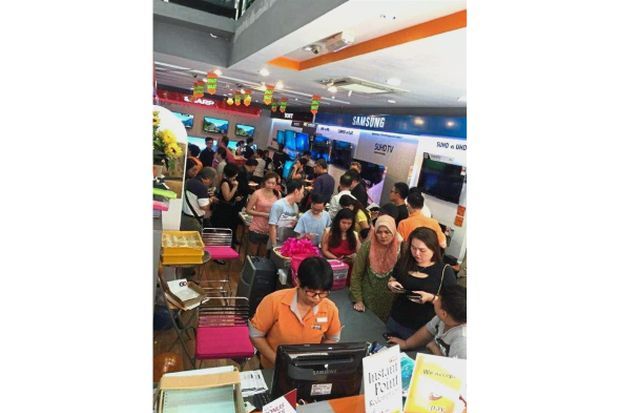Malaysia: Challenging days still ahead for retail
THE new year may not necessarily spell out cheery new beginnings for retailers as retail businesses in Penang continue to face lukewarm prospects. Consumer confidence is expected to stay soft while uncertainties in the global economy persist.
This is, nonetheless, in line with trends of the Consumer Sentiments Index found in Malaysian Institute of Economic Research’s latest report, which shows that there is a 3.6 points decline quarter-on-quarter to 77.1 points in the third quarter of 2017.
According to Ban Hin Bee general manager Wilson Yeoh, sales for 2017 is expected to be flat compared to 2016.
“This is the first time we are experiencing flat sales. For the past three years, there had been no flat sales.
“The spending pattern of consumers show little confidence in the market.
“The Hari Raya sales, for example, were down this time by about 20% compared to the same period a year ago. It is usually not down by so much,” he says.
But Yeoh expects sales of essential household appliances such as washing machines and refrigerator to improve till the end of the year due to the recent floods.
“Households affected by the recent flooding would be buying new appliances to replace the damaged ones.
“We provide flood relief subsidy up to RM200 to replace their household appliances. We also provide free repairs for certain appliances such as television, washing machines, and refrigerators, damaged by the flood,” he adds.
Yeoh notes that the selling prices of essential household appliances such as washing machines and televisions have been maintained at last year’s level.
Popular models of washing machines are priced between RM600 and RM700, whereas a sizeable television brand is priced at slightly above RM1,000.
Consequently, Ban Hin Bee has doubled its promotions effort for this year.
Likewise, garment manufacturer and distributor Teo Guan Lee Corp Bhd is also facing a tough operating environment, particularly in marketing its products in departmental stores.
Group managing director Toh Kian Beng says overall consumer business has come under pressure since the Goods & Services Tax was introduced in April 2015.
Additionally, lower tourist arrivals, changing consumer preferences and behaviour and intense competition from both local and foreign brands as well as from the e-commerce segment are of little help to retailers.
“The property and equity investment holding segment for the group, on the other hand, has remained fairly stable although there is an oversupply of retail space in shopping malls and a slowdown in the property sector,” says Toh.
From the group’s perspective, the rising cost of living is a primary cause of concern as it will impact retail spending.
The group’s revenue for the financial year ended June 30, 2017 dipped 7.68% to RM92.6mil from RM100.31mil in the previous year, due to lower sales from the existing consignment outlets and closure of non-performing outlets.
Its pre-tax profit fell 15% from RM7.11mil to RM6.05mil for the same period.
“Despite the higher cost of goods due to the weakened ringgit, we managed to maintain the gross margins of 40% due to our long-term relationship with suppliers offering special pricing, bulk purchase and product bundling,” she says.
Teo Guan Lee’s house brands are Kiki-Lala and Cuddles.
It also has licensed brands including Garfield, Tom & Jerry, Power Puff Girls, Dora, Madagascar, Kung Fu Panda, How to train your dragon and Shrek.
The retail experience needs to be reinvented in order to lift the consumer goods industry out of the current doldrums, according to Pensonic Holdings Bhd chief executive officer Dixon Chew.
Chew says one of the main weaknesses of the retailing industry today is in providing professional retail experience to the customers.
“This involves not only providing the customer with the appropriate information and after-sales customer service. From the moment the customer enters your premises, he or she must have the feel that they have made the right choice in visiting your shop.
“Many times, such an experience is lacking in the current retailing industry.
“Investing in human resource training is only one aspect that needs to be improved on for this. There are other angles, such as how products are displayed and tested for example, that needs to be looked at as well,” he says.
Chew believes the slowdown in the retail industry is not due to the competition from on-line shopping alone.
“On-line shopping cannot really provide a comprehensive shopping experience for the customers. Customers really need that face-to-face interaction with the sales person to get that kind of comprehensive shopping experience.
“This is where the retail sector can step up their efforts to improve on providing professional retail experience to customers,” he adds. On the group’s performance for the financial year ended May 31, 2017, Chew notes that domestic sales dropped by about 10% from 2016.
Domestic sales contribute about 70% to the group’s revenue.
According to a recent Retail Group Malaysia (RGM) report, sales in the local retail industry contracted 1.1% in the third quarter on eroding Malaysians’ purchasing power.
“Despite strong economic performance during the third quarter, majority of consumers did not receive higher take-home pays.
“The propensity to spend was not high as reflected in the decline in CSI during the same period,” says the report.
Members of Malaysia Retailers Association (MRA) project the third quarter growth rate in August 2017 at 2.9%. The latest figure was also way below RGM’s forecast at 4%.
Going forward, members of MRA estimate an average growth rate of 3.8% for the fourth quarter of 2017.
Source: https://www.thestar.com.my/metro/smebiz/retail/2017/12/18/challenging-days-still-ahead-for-retail/#b9QLhiMRyCDj5x46.99


 Thailand
Thailand




